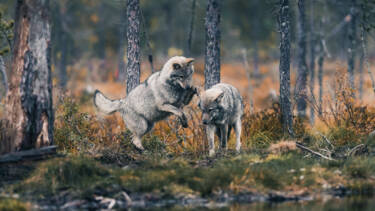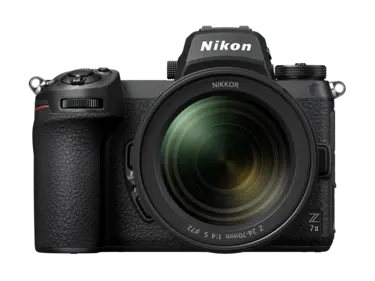Looking wildlife in the eye with the Nikon Z 7II

Get closer to nature with wildlife photographer Konsta Punkka and learn from his extensive experience photographing bears and wolves on the Finnish-Russian border. Konsta shares how to conceal your camera, shoot remotely and how to use a hide
I have been photographing wildlife, especially mammals, for the past seven years in Finland. The subject varies from foxes and moose to wolves and bears, so when I heard that I would have a chance to test out the Nikon Z 7II camera with Z series lenses, I immediately knew that I would love to try the gear to photograph a wolf pack here in the Eastern Finland and document two new wolves who were born to the pack.

Photographing shy animals in the wild
When photographing wolves or bears in Finland, you have to use a hide to photograph the shy animals. The hide is a small wooden box where you have gaps for your cameras in the wall and reflective windows to observe the local wildlife without disturbing them. I had planned to stay in the hides for a few days and see what nature had in store for us.
On the first day, I decided to use a hide close to a local swamp area. Local bears and wolves had been seen in the area quite frequently the past few days so my hopes were high. After a few hours of waiting, the first bear came to the area. I had my Nikon Z 7II camera body attached to my NIKKOR Z 400mm f/2.8 TC VR S lens. I slowly moved the camera around and managed to capture some first nice images of it.
Shooting portraits of wild animals in their natural habitat
It is nice to have a longer lens when capturing close up portraits of bears and wolves that can pass the hide up to 100m away. I mostly use a single spot focus to focus on the animal first and then reframe the image, but this time as I was unaware of the bears movements, I used the continuous AF to keep the focus on the animal while it ran through the bushes. I also tried out the Nikon Z 7II’s animal eye detecting focus system, which worked great especially with the wolves.
Planning is everything
While I had my 400mm f/2.8 lens attached to my Nikon Z 7II in the hide, I also wanted to try to capture some wide angle animal photos of the bears and wolves. I had a plan to put my other Nikon Z 7II body on a tripod with the new NIKKOR Z 14-24mm f/2.8 lens and control the camera remotely from my hide.
I hid the tripod using some leaves and branches I could find and left the camera facing the landscape where the animals often come to the area. I set the Nikon Z 7II on Bluetooth mode to control the camera using SnapBridge. I then went back to the hide and was able to wake the camera up with the app whenever any animal would pass the remote controlled camera close by.

As the daylight fades away relatively fast in the autumn, I put the setting on ‘Aperture priority’ mode allowing me to choose the aperture and then letting the camera to choose which shutter speed and ISO to use with the current light situation. As we stayed in the hide for six straight hours, there's no access to change the position or batteries during the photoshoot. Even though the camera was on stand-by mode for the whole time, there were no problems using SnapBridge to connect to the camera, and the battery life was amazing.

After a successful first day with a few bears and wolves, we decided to change location to a local pond area to try to capture some different kind of images of the bears and wolves. And oh boy, what a show we got to see!
After arriving at this new location, the whole wolf pack came to the area. Playing around the pond and running all around the swamp, it was the most wolf activity I had ever seen in a day. I had my Nikon Z 7II body attached to my 400mm lens again and on the other side of the pond, I had my remote controlled camera with the 14-24mm f/2.8 wide angle lens.
After a few hours of taking hundreds of photos of the wolves, I suddenly saw a golden eagle landing in the area. I quickly changed my single spot focusing to 3D focusing point with the continuous AF to capture as much as possible of this beautiful eagle's flight. Even though the golden eagle was flying between the trees, the Nikon Z 7II kept the focus perfectly on the subject and I was able to capture the whole flying sequence.

In the end, the two days spent in the Finnish-Russian border zone were some of the most successful ones I have had with the wolf pack. Close up encounters and action sequences — everything I had dreamed about and more.
The Nikon Z 7II managed the two days in the hide especially well with the battery life. The new double processing power helped me to focus faster and not to miss any moments, and the two card slots gave me enough space to capture everything without buffering. I cannot wait for my next trip with this gear!

Look wildlife in the eye
Watch Konsta Punkka on the Finnish-Russian Border
Looking for more tips? Here are some from Nikon School
Supported by two Expeed 6 processors, Nikon Z 7II offers powerful autofocus options and great low light AF performance. Here’s a couple of quick tips on how to get started using the AF modes:
- For static subjects use Single AF mode and utilize any of the 493 AF points to frame you image perfectly and place the focus right where you want — no need to focus and reframe. If the subject moves slightly, like a leaf falling from a tree, switch from “AF-S” (single) to “AF-C” (continuous) mode, hold your shutter half pressed or your AF-On button and the camera will track the movement as long as the subject is still under an active focus point or area.
- The Nikon Z 7II offers many ways to track moving subjects including Auto Area, dynamic focusing and wide area or small area focusing modes. When you are dealing with moving subject, select AF-C and then one of the “Auto Area” modes, either Human or Animal eye tracking depending on the subject you are tracking.

- For more flexibility, or if you want to track something other than a human or animal, you don’t have to switch the settings at all. Just press the “ok” button on the back of the camera, and track subjects using the Subject Auto AF tracking AF mode. Looking through your viewfinder or on the your rear LCD backscreen you now see a white box, which can be moved around with the multi selector control buttons on the back of the camera or simply by tapping on the subject on your touch screen. The box turns yellow and will track your chosen subject as it moves across the frame. To release tracking or choose another subject, simply press the “okay” button and reposition the AF box to your liking. Switching back to eye / face detections is just as easy: just hit press the “-” button next to the bottom of the touch screen.
- The AF-ON button on the Z series camera enables you to use ‘back button focusing’. This is an advanced way of focusing your camera and enables you to achieve a high rate of ‘keepers’ especially when shooting fast moving subjects ultilising the increased frame rates and buffer performance from the Z 6II or Z 7II. If you keep the ‘AF-ON’ button pressed down continually, you are now focusing the camera with the ‘back button’. The shutter is now used to shoot your images while you hold the AF-ON button down. To get even more performance from the Z series Auto Focus system, you could use the custom settings menu and adjust the tracking sensitivity to determine how long the camera holds your subject in focus.
Into the wild
Capturing the essence of Kenya with Roie Galitz and the Z 9

Capture the action












